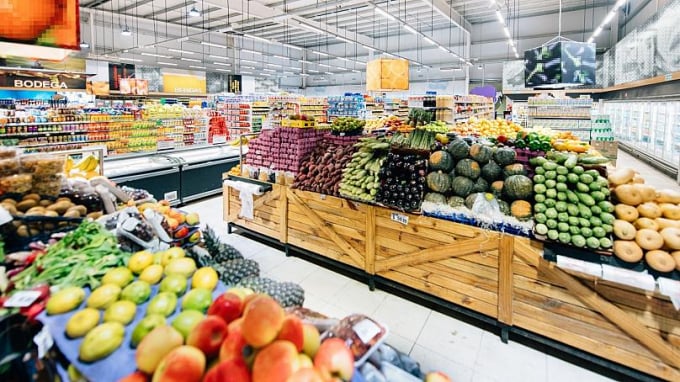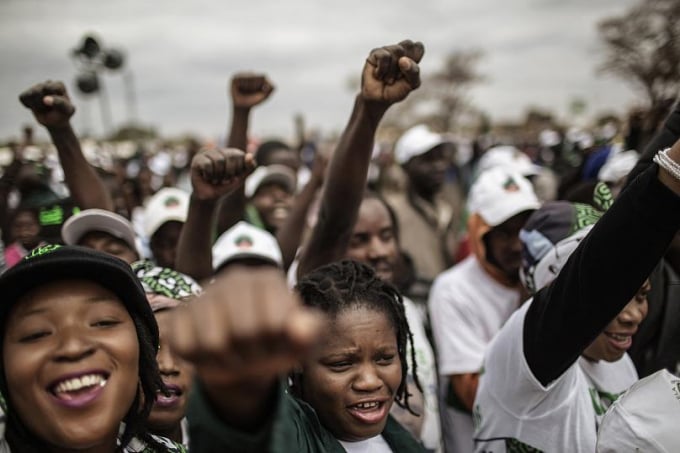May 21, 2025 | 04:24 GMT +7
May 21, 2025 | 04:24 GMT +7
Hotline: 0913.378.918
May 21, 2025 | 04:24 GMT +7
Hotline: 0913.378.918

Eosta, an organic fruit and vegetable distributor in the Netherlands, is enabling consumers to make more informed decisions in the supermarket. Photo: Canva
As the human impact on the Earth’s ecosystems and climate becomes alarmingly clear, ensuring food systems that are sustainable, secure, and equitable is one of the most pressing issues of our time.
The industrial food system, largely dependent on fossil fuels and non–renewable inputs, is a major pollutant and a root cause of eroding human health, social cohesion, rural livelihoods, and important cultural traditions. With that, the call is growing louder for drastic transformation of our political institutions, corporate structures, energy systems, governance arrangements, and food and agricultural practices to address the planet’s interconnected challenges.
The Beacons of Hope initiative shares stories of the people and organisations transforming our food systems in creative and dynamic ways.
Established in 2019, Beacons of Hope taps into the groundswell of interest all over the world in transforming food systems, shining a light on this work so that others can also be inspired to learn and - where possible - act differently. Through their stories, we can see how the climate-nature-food crises are connected and, more importantly, that another way is possible.
Ethical supermarkets and agroecology
Take for example, Eosta, an organic fruit and vegetable distributor in the Netherlands that is enabling consumers to make more informed decisions in the supermarket.

Supporters crowding in Zambia. Photo: AFP
Eosta used True Cost Accounting (TCA) to show customers the hidden costs that come as a result of industrial modes of food production - from the under-paid farm workers who pick mangoes, to the use of harmful pesticides that then pollute a nearby stream.
Fruit and vegetables sold by Eosta are accompanied by price tags that clearly compare the impact of industrial farming systems versus organic farming systems, encouraging customers to make purchases that are fair to producers, society, and the environment.
Meanwhile in Zambia, where depleted soils and erosion - accelerated by climate change - were a grave concern after decades of poor farming practices, another initiative is working with locals to improve food security and protect wildlife. Faced with poverty and food shortages, many communities had turned to wildlife poaching, hunting elephants and kudu, to make money and feed their families.
In 2009, wildlife biologist, Dale Lewis, set out to change this through Community Markets for Conservation (COMACO) - a social enterprise that trains poachers and local farmers in agroecological practices and buys their crops back at premium market prices.
Participating farmers have seen improved crop yields, income diversification and a 78 per cent increase in food security levels.
COMACO’s success comes from its multi-pronged approach that focuses on ecological inputs as well as climate-resilient agriculture and sustainable land management practices. The introduction of legume food crops and rotational planting, for example, allows improved soil health, while the adoption of agroecology and agroforestry has eliminated the need for expensive and harmful chemical fertilisers. The initiative has helped more than 185,500 farmers adopt these practices across more than 1,000 square kilometers of land.
Another Beacon of Hope comes from the Andhra Pradesh state of India where farmers are harnessing nature to grow better quality food for their families, communities, and to sell to market. The region is on track to become the first 100 per cent natural farming state thanks to Community Managed Natural Farming (CMNF), which encourages ecological growing practices and eliminates chemical fertilisers and pesticides.
The four core principles of CMNF have been localised across Andhra Pradesh, and include coating seeds and young plant roots in a microbe-rich formulation made from cow urine and dung to protect the plants from fungus and disease, and ensuring plant roots have access to water vapour. By 2024, the regional government plans to support approximately six million farmers to switch from chemical-dependent farming to CMNF, which has already helped thousands of families grow healthier plants at no added expense.
Other initiatives are using science and diverse knowledge to fight against climate change and reclaim land for local livelihoods. The SEKEM initiative was founded by Dr. Ibrahim Aboulesih, an Egypitan medical researcher, after he and his wife started farming in an area of desert northeast of Cairo.
Using biodynamic methods, within a few years the couple had transformed the land into an oasis and had enough medicinal herbs and food produce to export.
(Euro News)

(VAN) Attempts to bring down the price of the Japanese staple have had little effect amid a cost-of-living crisis.

(VAN) Fourth most important food crop in peril as Latin America and Caribbean suffer from slow-onset climate disaster.

(VAN) Shifting market dynamics and the noise around new legislation has propelled Trouw Nutrition’s research around early life nutrition in poultry. Today, it continues to be a key area of research.

(VAN) India is concerned about its food security and the livelihoods of its farmers if more US food imports are allowed.

(VAN) FAO's Director-General emphasises the need to work together to transform agrifood systems.

(VAN) Europe is facing its worst outbreak of foot-and-mouth since the start of the century.

(VAN) The central authorities, in early April, released a 10-year plan for rural vitalization.